Currently, the region is in desperate need of cash and wants to ensure revenue in 2016, amid a slump in global oil prices.
In 2015, the central government in Baghdad did not pay the self-ruled Kurdistan Regional Government (KRG) its 17 percent share of the federal budget, and this lack of commitment persists in 2016, Izzat Sabir Ismael, chairman of the Kurdish parliament’s finance and economic affairs committee, told Bloomberg.
"Oil prices are low, and government revenues in 2015 were about $50 billion at best, which means half of what has been forecast," he was quoted as saying by Bloomberg.
He explained that if the KRG delivers to the central government the agreed quantity of 550,000 barrels a day, Baghdad will not be able to pay the region its share of the budget, about $1 billion a month.
The KRG has fallen months behind in paying fees to international oil companies as well as wages to its public sector employees, the article read. The Kurds have been independently exporting their crude via a pipeline through Turkey since June 2015. KRG finances have been eroded by the budget impasse, the decline of oil prices and the ongoing fight against Daesh (Islamic State) militants in Iraq.
The Kurds say their oil reserve may be estimated at 45 billion barrels, almost a third of the deposits in the rest of Iraq, the second-biggest producer in the Organization of Petroleum Exporting Countries (OPEC).


